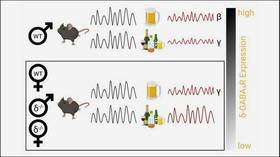Study compares alcohol effects on males and females

Alcohol affects brain activity in male and female mice differently, a new study has revealed, with males found to be more prone to behavioral and emotional changes.
According to the study, published on Monday in the peer-reviewed academic journal eNeuro, alcohol alters activity in the brain area known as the basolateral amygdala (BLA), often causing mood disorders, such as anxiety and fear, in both mice and humans. The researchers demonstrated that “acute and repeated alcohol exposure can alter network oscillations (changes in synchronized brain activity affecting mood and behavior) in the BLA which control the behavioral expression of fear and anxiety.”
“Further, we demonstrate sex differences in alcohol’s ability to modulate BLA network states,” the scientists from Boston-based Tufts University said.
The researchers administered alcohol to mice and analyzed changes in oscillatory states in the amygdala. The tests revealed that the effect was different in male and female subjects, especially after repeated alcohol consumption. The oscillatory state of females was not affected – despite their brain activity still changing under the influence of alcohol – while males were clearly impacted and demonstrated behavioral changes.
The researchers concluded that this difference is related to a subunit containing a GABAA receptor, which is sensitive to alcohol and anxiety but also to ovarian steroid hormone modulation.
In fact, when the scientists repeated the experiment on male mice without this subunit, they responded to alcohol similarly to females.
While more research is necessary to evaluate certain other factors, such as sensitivity or tolerance to alcohol, the authors believe the study potentially points to “a novel mechanism mediating the effects of alcohol on affective states.”
The publication came less than a year after another study, in which researchers from the University of Arizona said that women are more prone to excessive drinking as stress appears to be a more significant trigger for them. Women are also more likely to develop alcohol-related diseases, the scientists claimed.













